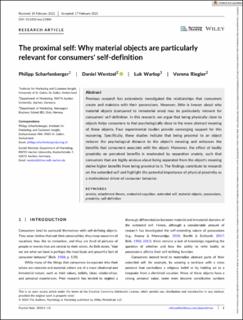The proximal self: Why material objects are particularly relevant for consumers' self-definition
Peer reviewed, Journal article
Published version
Permanent lenke
https://hdl.handle.net/11250/3056429Utgivelsesdato
2023Metadata
Vis full innførselSamlinger
- Scientific articles [2181]
Originalversjon
https://doi.org/10.1002/mar.21804Sammendrag
Previous research has extensively investigated the relationships that consumers create and maintain with their possessions. However, little is known about why material objects (compared to immaterial ones) may be particularly relevant for consumers' self-definition. In this research, we argue that being physically close to objects helps consumers to feel psychologically close to the more abstract meaning of these objects. Four experimental studies provide converging support for this reasoning. Specifically, these studies indicate that being proximal to an object reduces the psychological distance to the object's meaning and enhances the benefits that consumers associate with the object. Moreover, the effect of bodily proximity on perceived benefits is moderated by separation anxiety, such that consumers that are highly anxious about being separated from the object's meaning derive higher benefits from being proximal to it. The findings contribute to research on the extended self and highlight the potential importance of physical proximity as a motivational driver of consumer behavior. The proximal self: Why material objects are particularly relevant for consumers' self-definition

